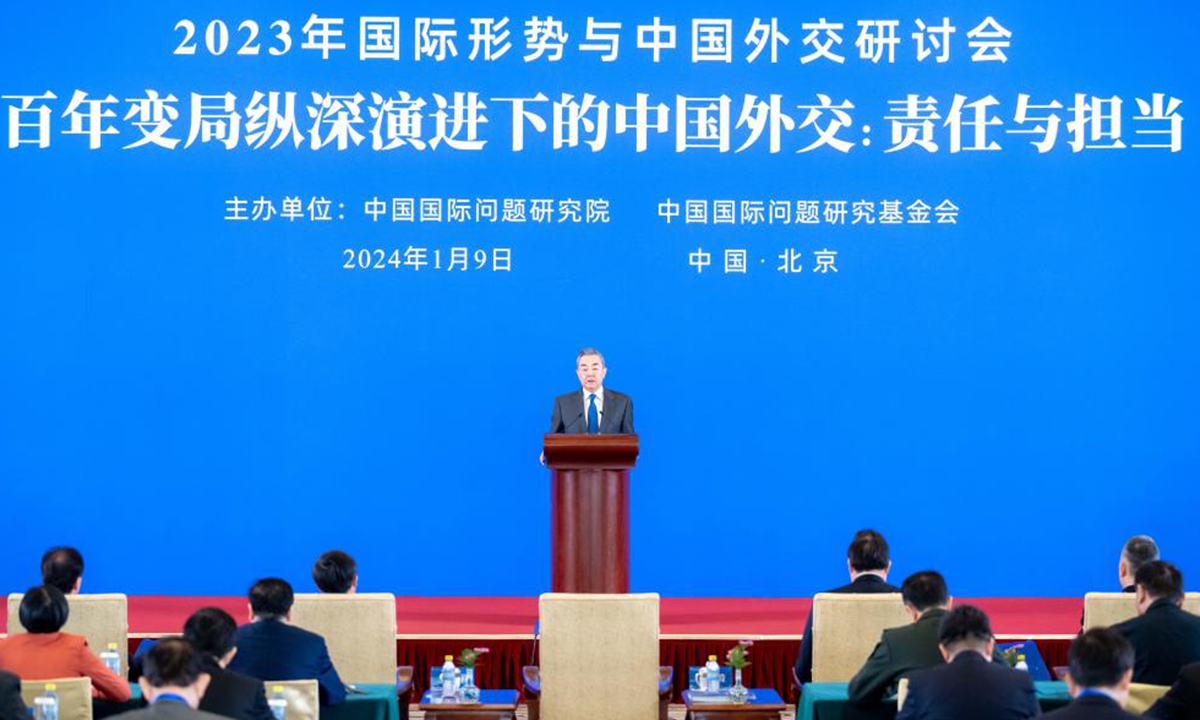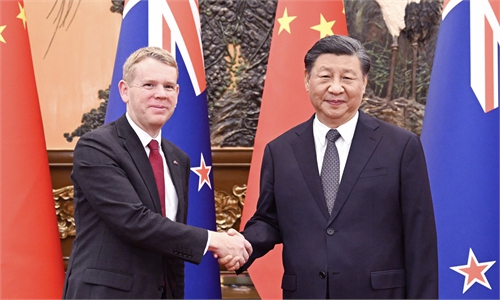
Chinese Foreign Minister Wang Yi, also a member of the Political Bureau of the Communist Party of China Central Committee, addresses the symposium on the international situation and China's foreign relations in 2023 in Beijing, capital of China, Jan. 9, 2024. (Xinhua/Zhai Jianlan)
2023 witnessed a series of highlights and achievements in China's diplomacy. China's major-country diplomacy with Chinese characteristics is expected to inject more stability into 2024, while in contrast, US diplomacy's uncertainty is increasingly worrying the world.On Tuesday, Member of the Political Bureau of the CPC Central Committee and Foreign Minister Wang Yi attended and delivered a speech at the opening ceremony of a symposium on the international situation and China's diplomacy in 2023. In his speech, Wang called 2023 "a year of exploration and harvest for China's diplomacy."
2023 was a crucial year for China's diplomacy, which advanced steadily and pragmatically. Looking back on it, China's diplomacy achieved some remarkable breakthroughs in new areas. In particular, as a member of the Global South, China strengthened closer coordination with other developing countries, from brokering a rapprochement between Saudi Arabia and Iran, holding the first-ever China-Central Asia Summit, to successfully pushing for the historic expansion of the BRICS.
In addition, China has also reaped the fruits of the seeds of peaceful development planted years ago. The China-proposed Belt and Road Initiative and the concept of "a global community of shared future" both entered their 10th year last year since their proposal and have entered a new phase of development based on steady construction. And regarding relations with other major countries and global players, under the strategic guidance of head-of-state diplomacy, China in 2023 continued to see a deepening relationship with Russia, while its ties with the US and Europe have moved toward stability.
These highlights demonstrate distinct Chinese characteristics, style, and ethos, and speak to China's enhanced international influence, stronger capacity to steer new endeavors, and greater moral appeal in the new era, said Wang.
The pillar of these outstanding achievements is major-country diplomacy with Chinese characteristics that Beijing has adopted for many years. Cui Hongjian, a professor with the Academy of Regional and Global Governance at Beijing Foreign Studies University, told the Global Times that major-country diplomacy with Chinese characteristics emphasizes that China's diplomacy should reflect the unique characteristics of China's national conditions and inherit the country and its people's historical and cultural genes, such as the pursuit of peace and harmony.
On the other hand, major-country diplomacy with Chinese characteristics focuses on how China understands its diplomatic tasks as a major country. In other words, the country believes that a major country needs to take on more responsibilities in global affairs, not fight for more benefits for itself or bully other countries.
During its implementation, major-country diplomacy with Chinese characteristics has kept adapting to the changes in the international situation and made contributions to the world. It is precisely because of the very existence of such "constant adjustments" that China's diplomacy is believed to inject stability into the year 2024 and continue to contribute to world peace, stability and prosperity.
According to Cui, China's diplomacy could do many things in 2024. As the conflicts in Ukraine and the Gaza Strip have entered a critical period this year, China can put forward more concrete proposals based on its position of promoting a cease-fire. It is also expected to push for cooperation with other major global players based on stable ties and show more room for maneuvering with its neighbors and other developing countries.
In contrast to China's prominent diplomatic achievements, US diplomacy last year not only appeared increasingly feebler due to the constraints of domestic issues, but also maintained its posture of seeking to profit from the chaos and tensions.
In the face of China's rise, the US' containment reached a new peak in 2023, ranging from instigating the Philippines against China over South China Sea disputes, enhancing the cooperation with South Korea and Japan to counter "challenges from China," to building a "smaller yard, higher fence" in fields such as semiconductors, quantum computing and artificial intelligence to strangle China's development.
In addition, after the escalation of the Palestine-Israel conflict in October, the US has repeatedly stood against the international community that seeks peace in the Middle East. By condoning the continuation of the war, it doesn't have the slightest sense of responsibility as a world power, but only shows "partiality" and "double standards."
Judging from the current circumstances in the country, US diplomacy will only become more worrying to the international community this year. Experts believe it may be difficult or even impossible for Washington to make any strong diplomatic move, since the presidential election later this year will dominate US politics all year and influence Washington's diplomatic choice. Yet, since what path will the country take after this election is still uncertain, US diplomacy is and will continue to be a destabilizing factor in how the world develops in the foreseeable future.


